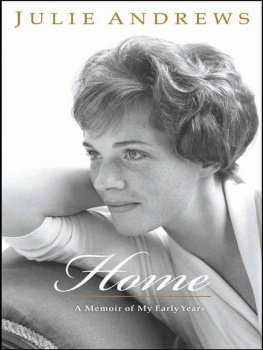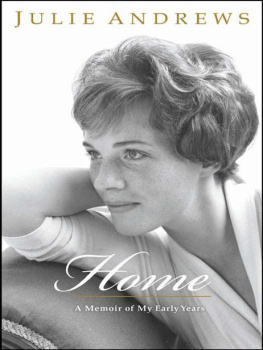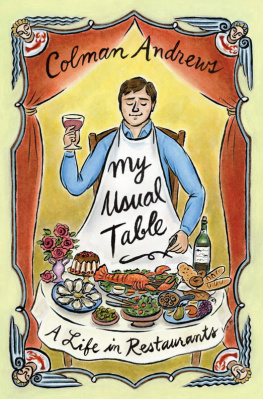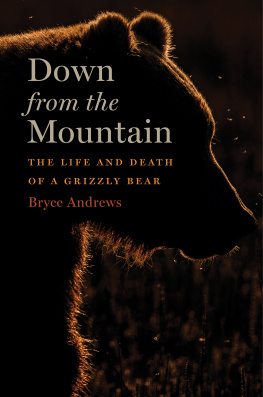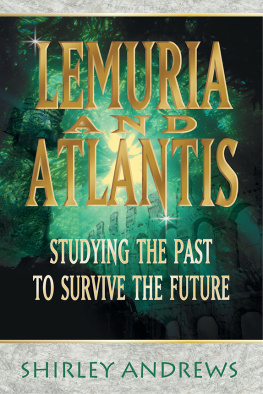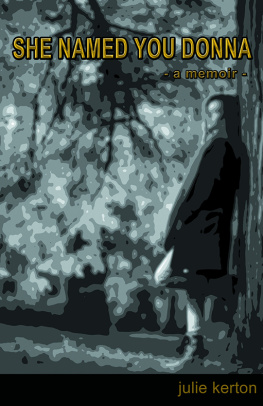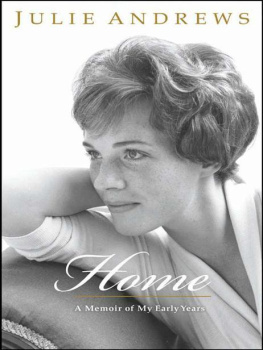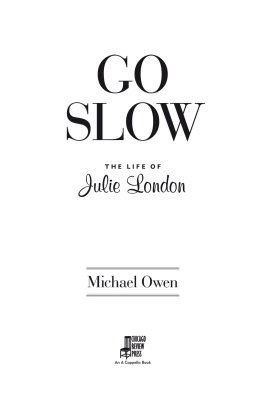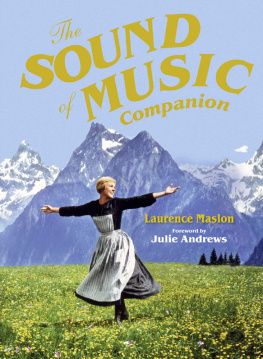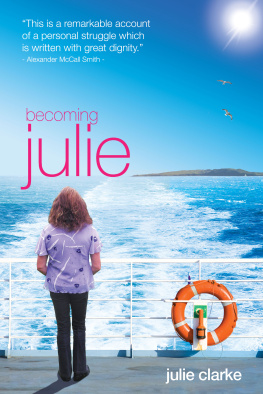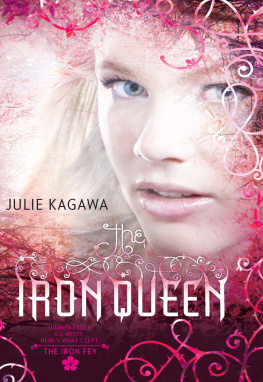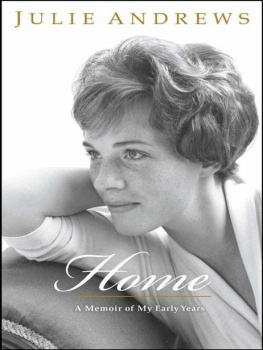Julie Andrews
Home
A Memoir
of
My Early Years

For Emma,
with all my love
Contents
I AM TOLD THAT the first comprehensible word I uttered
OVERNIGHT, CHILDHOOD ENDED for the girls and the business of
WHEN I WAS two and a half, my brother John
ON MAY 10, 1940, the same day that Winston Churchill
SOON AFTER DONALDS birth, we moved from Camden Town to
THE WAR ESCALATED yet again. Barrage balloons, defending against low-flying
I TOOK LESSONS WITH Madame once a week at first.
ON MAY 8, 1945, peace was declared in Europe. My
WIN HAD GIVEN birth to a baby girl in September
THE OLD MEUSE, as the house was called, was at
JUST BEFORE MOVING to The Old Meuse, I did my
WE PLAYED TWO performances every night but Sunday, with no
DURING THE RUN of Starlight Roof, Aunt Joan became pregnant.
A FEW WEEKS after I finished performing in Starlight Roof
MUM, POP, AND I spent the summer of 1949 working
DAD AND WIN moved to a village on the Sussex/Surrey
I CONTINUED TO work with Madame Stiles-Allen. Early in my
SOMETIME THAT AUTUMN, my mother announced that she and I
IN JUNE OF 1950, I began work as a resident
AFTER RED RIDING HOOD closed, I went out on the
IN LATE OCTOBER of that year, Pop managed to procure
THAT CHRISTMAS OF 1951, I was invited to play the
TONY WALTON AND I continued to see each other whenever
A GIRLS VOICE DOESNT break like a boys in the
DURING THE TOUR of Cap and Belles, I began to
CINDERELLA ENDED ITS run in March, and I was not
A FAREWELL PARTY had been planned for me: a last
REHEARSALS FOR The Boy Friend were held at a theater
ONCE THE SHOW opened, the really hard work began. We
THE BOY FRIEND was a tremendous learning curve for me.
DURING MY BRIEF stay at home, Alan and Fritz had
POOR STANLEY HOLLOWAY had been waiting for his own chance
THE MARK HELLINGER Theater on West 51st Street was originally
MY MOTHER CAME to New York in early spring. She
IN OCTOBER OF that first year of My Fair Lady,
IN JULY AND November of 1956, I made two appearances
MY FINAL PERFORMANCE in My Fair Lady on Broadway was
THE OPENING NIGHT of My Fair Lady in London was
TONY AND I purchased a miniature gray poodle puppy, and
TO DESCRIBE NOW what theater means to me, and what
MAY 10, 1959, dawned clear and sunny. I spent the
ALTHOUGH MY CONTRACT in London was for eighteen months and
AROUND CHRISTMASTIME OF 1959, something that had been nagging at
JUST BEFORE DEPARTING for New York, I drove down to
AFTER THE IMMENSE size of Torontos OKeefe Centre, Bostons Shubert
TIM WHITE STAYED with us through Christmas, departing just before
TONY AND I ushered in the New Year sadly and
ALTHOUGH I HAD stolen a few days from Camelot in
AT THE END of May, we flew home to London.
Silver tinsel on the ground.
River, streams. A round
water tower. Shining sun
flooding woods and meadows. Spun
gold and steel. Clouds punctuate
the hills and valleys and great
white cliffs of Dover.
Sea and ships. And, crossing over,
my heart soars like this aeroplane,
and I know Im going home again.
JULIE ANDREWS
I AM TOLD THAT the first comprehensible word I uttered as a child was home.
My father was driving his secondhand Austin 7; my mother was in the passenger seat beside him holding me on her lap. As we approached our modest house, Dad braked the car to turn onto the pocket-handkerchief square of concrete by the gate and apparently I quietly, tentatively, said the word.
Home.
My mother told me there was a slight upward inflection in my voice, not a question so much as a trying of the word on the tongue, with perhaps the delicious discovery of connectionthe word to the place. My parents wanted to be sure they had heard me correctly, so Dad drove around the lanes once again, and as we returned, it seems I repeated the word.
My mother must have said it more than once upon arrival at our houseperhaps with satisfaction? Or relief? Or maybe to instill in her young daughter a sense of comfort and safety. The word has carried enormous resonance for me ever since.
Home.
THE RIVER THAMES begins as a trickle just above Oxford in an area referred to in old literature as Isis. The trickle has become a fair river and fordable by the time it reaches the great university city, and from there it winds its way through the English countryside, changing levels from time to time, spewing through the gates of some exquisitely pretty locks, passing old villages with lovely names like Sonning, Henley, Marlow, Maidenhead, and Bray.
It flows on through Windsor and Eton. Wicked King John signed the Magna Carta at a picturesque stretch of the Thames called Runnymede. It progresses through the county of Surrey, past Waltonthe village where I was bornpast the palace of Hampton Court where Sir Thomas More boarded the water taxis that carried him downriver after his audiences with Henry VIII, and continues through the county town of Kingston, on to Richmond and Kew. Finally it reaches London, gliding beneath its many bridges, passing the seat of British government, the Houses of Parliament, before making its final journey toward Greenwich and the magnificent Thames Estuary into the North Sea.
Because of the Thames I have always loved inland waterwayswater in general, water soundstheres music in water. Brooks babbling, fountains splashing. Weirs, waterfalls; tumbling, gushing. Whenever I think of my birthplace, Walton-on-Thames, my reference first and foremost is the river. I love the smell of the river; love its history, its gentleness. I was aware of its presence from my earliest years. Its majesty centered me, calmed me, was a solace to a certain extent.
The name Walton probably derives from the old English words wealh tun (Briton/serf and enclosure/town). Remnants of an ancient wall were to be found there in my youth. Walton is one of three closely related villages, the others being Hersham and Weybridge. When I was born, they were little more than stops on the railway line leading out of London into the county of Surrey. Hersham was the poor relative and had once been merely a strip of woodland beside another river, the Mole. It was originally occupied by Celts, whose implements were found in large numbers in the area. The Romans were there, and Anglo-Saxons were the first settlers. Hersham was very much a fringe settlement. Walton, slightly better off, was a larger village; Weybridge was altogether upmarket.
Waltons small claim to fame was its bridge over the Thames. A very early version was painted by Canaletto; J. M. W. Turner painted a newer bridge in 1805. The span was reconstructed again long ago, but in my youth the bridge was so old and pitted that our bones were jarred as we rattled over it, and I was able to peer through the cracks and see the river flowing beneath. Driving across, away from the village, usually meant that I was leaving home to go on tour with my parents. Crossing back, though, was to know that we were in familiar territory once again. The river was our boundary; we could leave the busy world behind us and our front door was only moments away.
To this day, when I am flying into England, it is the view of the river that I search for as we descend toward Heathrow. And suddenly, I see itstately, sparkling, winding through the meadows, forever soothing, forever serene.
I WAS NAMED after my two grandmothersJulia Elizabeth.
Julia, my mothers mother, was the eldest daughter of William Henry Ward. He was a gardener, and met my great-grandmother, Julia Emily Hearmon (always referred to as Emily), when they joined the staff of a large house in Stratford-upon-Avon. Great-Granny Emily was a tweeny, which is the name given to the poor unfortunate who gets up even before the servants and lights their fires so that they, in turn, can see to the comforts of the household. She was eleven years old when she went into service.

